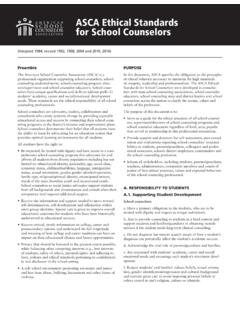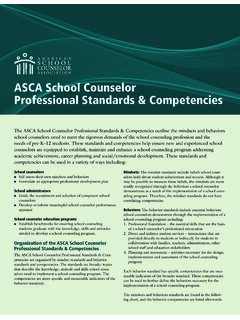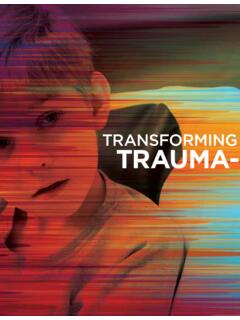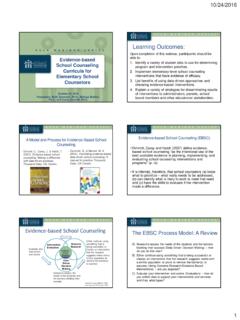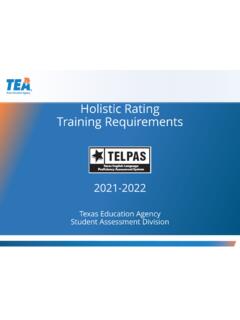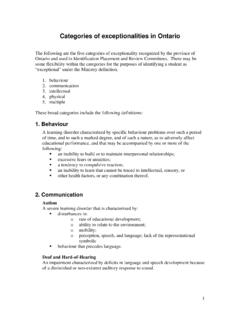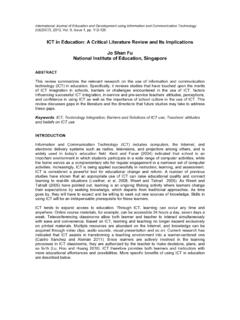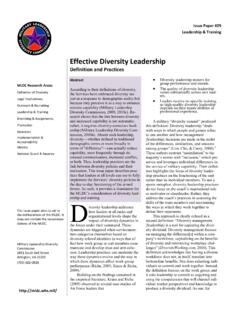Transcription of ASCA Student Standards: Mindsets & Behaviors for Student ...
1 ASCA Student Standards: Mindsets & Behaviors for Student SuccessK-12 College-, Career- and Life-Readiness Standards for Every StudentThe ASCA Student Standards: Mindsets & Behaviors for Student Success describe the knowl-edge, attitudes and skills students need to achieve academic success, college and career readi-ness and social/emotional development. The standards are based on a survey of research and best practices in Student achievement from a wide array of educational standards and Student Standards: Mindsets & Behaviors for Student SuccessK-12 College-, Career- and Life-Readiness Standards for Every StudentEach of the following standards can be applied to the academic, career and social/emotional 1: Mindset StandardsSchool counselors encourage the following Mindsets for all 1. Belief in development of whole self, including a healthy balance of mental, social/emotional and physical well-beingM 2.
2 Sense of acceptance, respect, support and inclusion for self and others in the school environment M 3. Positive attitude toward work and learning M 4. Self-confidence in ability to succeedM 5. Belief in using abilities to their fullest to achieve high-quality results and outcomesM 6. Understanding that postsecondary education and life-long learning are necessary for long-term successCategory 2: Behavior StandardsSchool counselors provide culturally sustaining instruction, appraisal and advisement, and counseling to help all students demonstrate:Learning StrategiesSelf-Management SkillsSocial SkillsB-LS 1. Critical-thinking skills to make informed decisionsB-SMS 1. Responsibility for self and actionsB-SS 1. Effective oral and written communication skills and listening skillsB-LS 2. Creative approach to learning, tasks and problem solving B-SMS 2. Self-discipline and self-controlB-SS 2.
3 Positive, respectful and supportive relationships with students who are similar to and different from themB-LS 3. Time-management, organizational and study skillsB-SMS 3. Independent workB-SS 3. Positive relationships with adults to support successB-LS 4. Self-motivation and self- direction for learningB-SMS 4. Delayed gratification for long-term rewardsB-SS 4. EmpathyB-LS 5. Media and technology skills to enhance learningB-SMS 5. Perseverance to achieve long- and short-term goalsB-SS 5. Ethical decision-making and social responsibilityB-LS 6. High-quality standards for tasks and activitiesB-SMS 6. Ability to identify and overcome barriers B-SS 6. Effective collaboration and cooperation skillsB-LS 7. Long- and short-term academic, career and social/emotional goalsB-SMS 7. Effective coping skills B-SS 7. Leadership and teamwork skills to work effectively in diverse groupsB-LS 8.
4 Engagement in challenging courseworkB-SMS 8. Balance of school, home and community activitiesB-SS 8. Advocacy skills for self and others and ability to assert self, when necessary B-LS 9. Decision-making informed by gathering evidence, getting others perspectives and recognizing personal bias B-SMS 9. Personal safety skillsB-SS 9. Social maturity and Behaviors appropriate to the situation and environmentB-LS 10. Participation in enrichment and extracurricular activitiesB-SMS 10. Ability to manage transitions and adapt to changeB-SS 10. Cultural awareness, sensitivity and responsivenessOverviewThe 36 ASCA Student Standards are broad standards that identify and describe the knowledge, attitudes and skills students should be able to demonstrate as a result of a school counseling program. School counselors use the standards to assess Student growth and development, create culturally sustaining strategies and activities and build a program that helps students achieve their highest potential.
5 The ASCA Student Standards can be aligned with initiatives at the district, state and national levels to reflect local operationalize the standards, school counselors write or select measurable learning objectives that align with specific Mindsets or Behaviors , which become the foundation for classroom instruction, appraisal and advisement, and counseling activities addressing Student developmental needs. The learning objectives directly reflect the school counseling program s vision, mission and goals, as well as the school s academic StandardsThe ASCA Student Standards are based on a review of research and college-, career- and life-readiness documents that identify strategies influencing Student achievement and academic performance . The ASCA Student Standards are organized on the framework of noncognitive factors presented in the critical literature review Teaching Adolescents to Become Learners, conducted by the University of Chicago Consortium on Chicago School Research (2012).
6 This literature review recognizes that content knowledge and academic skills are only part of the equation for Student success. School performance is a complex phenomenon, shaped by a wide variety of factors intrinsic to students and the external environment (University of Chicago, 2012, p. 2). The ASCA Student Standards are based on the evidence of the importance of these 36 standards can be applied to any of the three school counseling domains of academic, career and social/emotional development. The school counselor selects a domain and standard based on the needs of the school, classroom, small group or standards are arranged within general categories of noncognitive factors related to academic performance as identified in the University of Chicago 2012 literature review. These categories synthesize the vast array of research literature (p. 8) on noncognitive factors including Mindsets , learning strategies, self-management skills and social skills for success.
7 Category 1: Mindset Standards Includes standards related to students psycho-social attitudes or beliefs about themselves in relation to academic work. These make up the Student s belief system as exhibited in 2: Behavior Standards These standards include Behaviors commonly associated with being a successful Student . The Behaviors are visible, outward signs that a Student is engaged as well as putting forth effort to learn. The Behaviors are grouped into three Learning Strategies: Processes and tactics students employ to aid in the cognitive work of thinking, remembering or Self-management Skills: Continued focus on a goal despite obstacles and avoidance of distractions or temptations to prioritize higher pursuits over lower Social Skills: Acceptable Behaviors that improve social interactions, such as those among peers or between students and Learning Objectives Grade-level learning objectives are specific, measurable expectations that students attain as they make progress toward the standards.
8 As the school counseling program s vision, mission and annual Student outcome goals are aligned with the school s academic mission, school counseling standards and learning objectives are also aligned with academic content standards at the state and district learning objectives are housed in the ASCA Student Standards database at School counselors can search the database by keyword to quickly and easily identify learning objectives that will meet Student developmental needs and align with specific ASCA Student Standards. The database also allows school counselors to contribute to the learning objectives by sharing other ways to meet or align with a specific ASCA Student Standards can be applied to three broad domains: academic, career and social/emotional development. These domains promote Mindsets and Behaviors that enhance the learning process and create a culture of college-, career- and life- readiness for every Student .
9 The domain definitions are as follows:Academic Development Standards guiding school counseling programs to implement strategies and activities to support and maximize each Student s ability to Development Standards guiding school counseling programs to help students 1) understand the connection between school and the world of work and 2) plan for and make a successful transition from school to postsecondary education and/or the world of work and from job to job across the Development Standards guiding school counseling programs to help students manage emotions and learn and apply interpersonal the ASCA Student StandardsSchool counselors use the ASCA Student Standards to guide the development, delivery and assessment of the three direct Student services as defined by the ASCA National Model: instruction, appraisal and advisement, and counseling.
10 The standards help school counselors determine what Student knowledge, attitudes and skills will be measured as they work to help all students become college-, career- and life-ready. School counselors deliver the ASCA Student Standards to all pre-K 12 students in classrooms, groups or individual settings in a manner that is appropriate for the students development level/age. School counselors review achievement, attendance and discipline data to guide the selection of specific Mindsets and Behaviors appropriate for the individual, group or grade level, as well learning objectives to operationalize the standards. School counselors implement the ASCA Student Standards through the following steps. 1. Identify need. School counselors identify a specific Student challenge found in the school s Student outcomes (achievement, attendance, discipline). Challenges could include: underperformance in achievement (standardized test scores, grades, credits earned) overrepresentation in discipline (offense categories, con-sequences) higher absenteeism (absences, late arrivals, early depar-tures, chronically absent) Specific developmental stages or differences may also serve as the basis for school counselor interventions.

